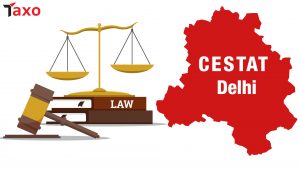 The Hon’ble CESTAT, Delhi vide its order dated 23.09.2022 in the matter of Commissioner, Central Excise & Service Tax, Large Taxpayer Unit, Delhi Vs. M/s Power Finance Corporation in Service Tax Appeal No. – 370/2012, dismissed the appeal filed by the department against the order of adjudicating authority, finding that the premium charged by the assessee from its customers for interest restructuring of loan is nothing but the loss of interest caused to the lender (assessee). Therefore, cannot be considered as ‘lending’ and subject to levy of Service Tax.
The Hon’ble CESTAT, Delhi vide its order dated 23.09.2022 in the matter of Commissioner, Central Excise & Service Tax, Large Taxpayer Unit, Delhi Vs. M/s Power Finance Corporation in Service Tax Appeal No. – 370/2012, dismissed the appeal filed by the department against the order of adjudicating authority, finding that the premium charged by the assessee from its customers for interest restructuring of loan is nothing but the loss of interest caused to the lender (assessee). Therefore, cannot be considered as ‘lending’ and subject to levy of Service Tax.
The Department preferred the appeal before the Hon’ble CESTAT, Delhi challenging the order dated 13.12.2011 passed by the Commissioner, Central Excise and Service Tax, LTU, New Delhi, whereby the demand proposed in the show cause notice issued to M/s Power Finance Corporation was dropped.
Facts: –
- The respondent is engaged in providing service under the category of ‘banking and other financial services’ (Section 65(12) of the Finance Act), taxable under Section 65(105) (zm) of the Finance Act.
- The audit of the records of the respondent for 2007-2008 to 2009-2010 was conducted by the officers of the Directorate General, Audit, and it was noticed that the respondent was providing loans for energy and energy efficiency projects, State Electricity Boards and private parties.
- It was observed that the respondent during the relevant period has charged Premium for interest restructuring of loans and treating the same as interest income has not paid Service Tax on the said amount of premium collected.
- Based on the above, a show cause notice dated 31.01.2011 was issued to the respondents proposing Service Tax demand of Rs. 01,11,57,422/- along with interest and applicable penalties, under the category of ‘Banking and Financial Services’.
- Later, the whole demand proposed against the respondent was dropped by the Commissioner by the impugned order dated 13.12.2011. Aggrieved of the same, the department has preferred the appeal.
Appellant’s Submissions: –
- That the Ld. Authorized representative appearing on behalf of the Appellant, submitted that the Commissioner erred in considering that premium is a portion of loss of interest income which the respondent will suffer on the account of swap allowed to the borrower for the higher rate of interest with the lower rate of interest and that the interest on loans is not subjected to service tax.
- It is not disputed that the respondent allowed the interest restructuring of loan after 3 years on payment of a ‘premium’ for the entire remaining period of loan. The respondent is facilitating the already existing borrower to take the advantage of the prevailing new low interest rate, if any, and thereby bringing down the borrower’s cost of borrowing the loan. Therefore, the premium charged is the consideration for the taxable service provided by the respondent.
- The ‘interest restructuring premium’ amount charged by the respondent is neither in relation to the loan amount lent to borrowers nor is it in relation to time elapsed or time to elapse for the repayment or the discharge of the loan amount. Thus, the interest restructuring premium‟ amount is not at all akin to the ‘interest’ as charged upon a loan.
- The ‘interest restructuring premium’ amount charged by the respondent is in lieu of the ‘suffering’ undergone by it and, therefore, a consideration received for the service provided to the borrowers by the respondent. Further, the method of quantification of the ‘interest restructuring premium’ amount charged does not make it akin to ‘interest’ on a loan.
- The Commissioner failed to appreciate that the ‘interest restructuring facility’, whereby the borrower is allowed to swap the higher rate of interest with the lower rate of interest is a facility provided to the borrower to take the advantage of the prevailing low interest rate, if any, and thereby bringing down cost of borrowing the loan.
Respondent’s Submissions: –
- On the other hand, the Ld. CA, Shri Atul Gupta, appearing on behalf of the respondent supported the impugned order and submitted that Interest restructuring charges are outside the ambit of ‘banking and other financial services’ as the premium received towards interest restructuring is in the nature of interest.
- Further even if it is considered, as contended by the Department, that the premium on interest restructuring of loan is same as fore/pre-closure charges, the issue has been decided by the Larger Bench of the Tribunal in Commissioner of Service Tax, Chennai vs. Repco Home Finance Ltd, holding that it would not be leviable to service tax under ‘banking and other financial services’.
- It was also submitted that the respondent was under a bonafide belief that the activity carried on by it is not taxable and this belief of the respondent stands confirmed as the demand has been dropped by the Commissioner. In such circumstance, there was no intention to evade payment of tax and so the extended period of limitation could not have been invoked.
Held: –
- The Hon’ble CESTAT after considering the submissions from the both sides and facts of the case, found that in order to provide the lower rate of interest, an option is given to the borrowers for interest restructuring of loan though the other terms of the contract remain unchanged. Further, as per the guidelines of the respondent, loans disbursed by it would be eligible for interest restructuring of loan subject to the stipulation that a loan which has been restructured for 3 years, shall be considered for further restructuring after 3 years on the payment of 50% of premium for the entire remaining period of loan.
- The Hon’ble Bench considering the definition as provided under Section 65(12) of the Finance Act, and made taxable under Section 65(105) (zm), found that the contention of the department is that the restructuring premium charged by the respondent falls under ‘lending’ and accordingly would be leviable to Service Tax under ‘banking and other financial services.’ The interest restructuring premium amount is not in relation to the loan amount and would, therefore, not be akin to interest.
- However, it has been contended on the behalf of the respondent that interest restructuring charges would be outside the ambit of ‘banking and other financial services’ as the term ‘lending’ means depositing of money or property with the expectation that the same will be returned, while in the case of ‘interest restructuring’, the borrower is allowed to swap the higher rate of interest with the lower rate of interest. Further the said amount of premium was charged on account of loss of interest caused to it by providing the lower and by agreeing to forgo its future income by way of interest and gets only a portion that interest in advance in the year in which interest restructuring is done
- The Hon’ble Bench taking note of the transaction involved in the matter discussed the same with and example i.e., if rate of interest (say 9%) is agreed upon between the respondent and the customer taking loan. However, in future, as per market prevailing rates, such rate of interest may be lower (say 6%). The respondent, in order to cover up some part of its losses (50%) due to reduction in interest rate, calculate the interest adjustment as per the formulae prescribed by the Reserve Bank of India and after receiving the same from the customer, agrees to restructure its applicable rate of interest to a lower rate (6%), and further taking note of the Guidelines of the Reserve Bank of India (2008) in relation to interest restructuring, found that it shows the method of computation of interest adjustment’ is nothing but the difference between the interest computed on higher rate of interest (say, 9%) and that computed on lower rate of interest (say, 6%) and such difference (including future installments) discounted to Net Present Value.
- The Hon’ble Bench after considering the illustration & computation referred by the respondent to explain the transaction involved, found that it is quite evident from the illustration that ‘the respondent was to receive total interest of Rs. 10,800 in next 3 years at the original interest rate of 9% as agreed upon but due to lowering down the interest rate to 6%, respondent will now receive Rs. 07,200 at 6% rate of interest in next 3 years. Therefore, to compensate for the loss of interest that is going to be caused to the respondent for reduction in rate of interest due to interest restructuring, respondent computed net present value of such loss (which comes out to Rs. 03,269.88/-) and collected 50% of the same as premium for interest restructuring while remaining 50% is the benefit gained by the customer due to interest restructuring.’
- Thus, premium so charged by the respondent from its customers due to interest restructuring is nothing but net present value of loss of interest that will be caused to the respondent, and the contention of the department that the premium charged would fall under ‘lending’ and would be subject to service tax under ‘banking and financial services’ cannot be accepted.
- Thereafter, the Hon’ble Bench considering another contention raised on the behalf of the respondent that ‘premium paid on the restructuring is in the form of ‘foreclosure Charges’ and would be taxable’, found that even if it assumed that it is in the nature of a foreclosure charges, it cannot be subjected to levy of service tax in view of the decision of the Larger Bench of the Tribunal in Repco Home Finance Ltd.
- Lastly, the Hon’ble Bench found that the extended period of limitation could not have been invoked in the matter as the respondent was under a bonafide belief that the activity carried on by it was not taxable and the belief of the respondent stands justified by the order of the Commissioner dropping the charges. Further, it also needs to be noted that the respondent had duly disclosed and recorded the information in its books of account. It cannot, therefore, be alleged that it had concealed or suppressed information with an intent to evade payment of service tax.
The Hon’ble CESTAT with the above findings, dismissed the appeal filed by the department observing that the order dated 13.12.2011 does not call for any interference in this appeal.



